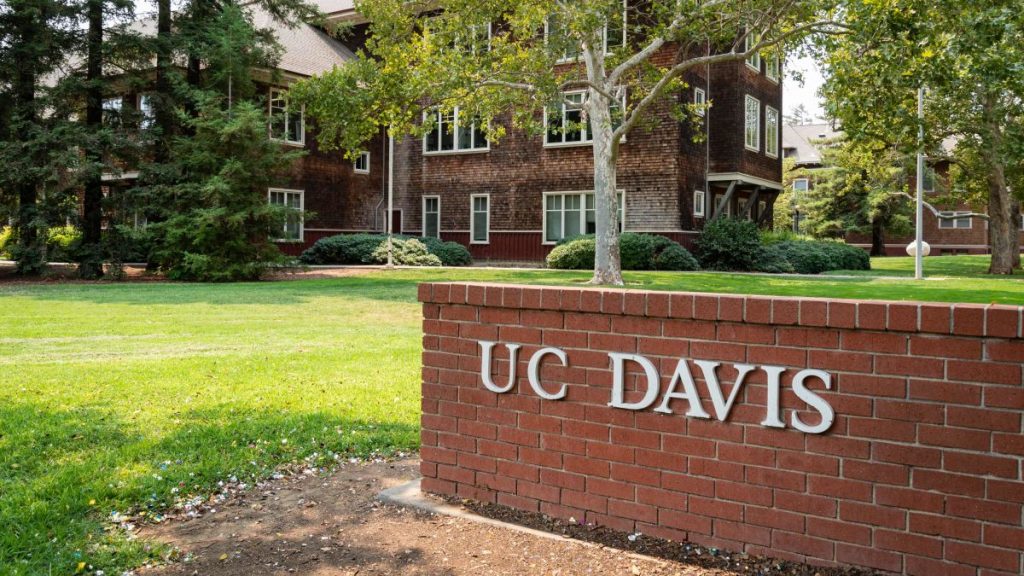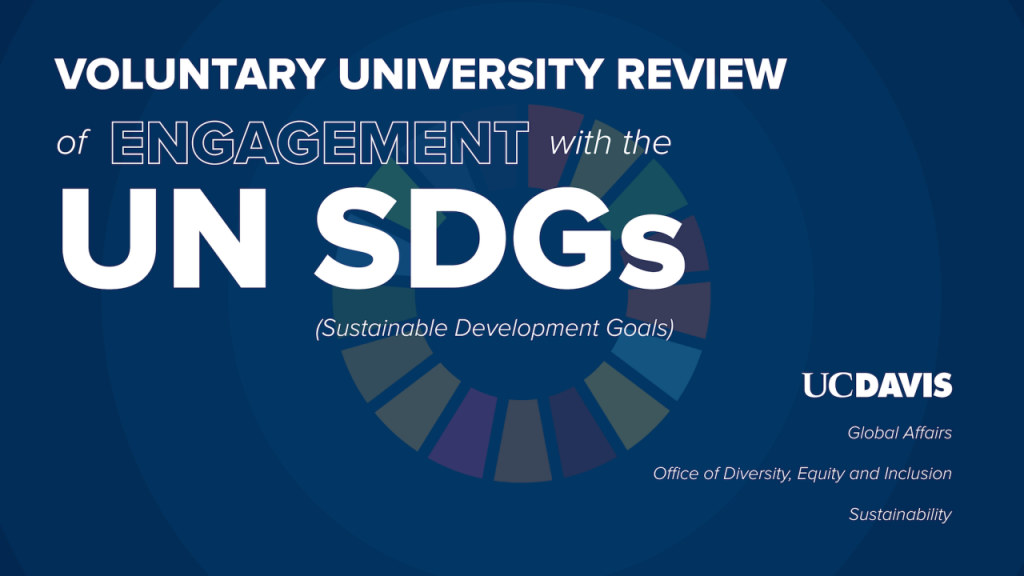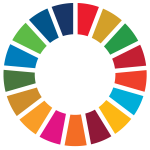Esta web utiliza cookies para que podamos ofrecerte la mejor experiencia de usuario posible. La información de las cookies se almacena en tu navegador y realiza funciones tales como reconocerte cuando vuelves a nuestra web o ayudar a nuestro equipo a comprender qué secciones de la web encuentras más interesantes y útiles.
UC Davis Voluntary University Review: Creating Campus Momentum for the SDGs
Description
Institution
University of California, Davis

Organizations/areas of the university involved
The full university is involved, and the effort is led by the Global Affairs, Sustainability and Diversity, Equity and Inclusion units. Collaborators on this case study include Camille Kirk, Director of Sustainability and Campus Sustainability Planner, Sustainability; Jolynn Shoemaker, Director of Global Engagement, Global Affairs; Kelli O’Day, Assessment Program Manager, Sustainability; and Tom Rosen-Molina, Global Centers Analyst, Global Affairs.
Country
united states
UC Davis is pursuing a Voluntary University Review to measure university progress, bring together campus strengths, and inform future strategies within the globally-recognized SDG Agenda.
In a wide variety of settings and through interdisciplinary activities, UC Davis students, faculty, and staff are addressing all 17 UN SDGs in the US and across more than 70 countries around the world. UC Davis is actively supporting the UN Sustainable Development Goals (SDGs) through innovation and collaboration in teaching, research and service, focusing on two central goals:
1. To raise awareness and inspire involvement in the SDGs among the UC Davis community
2. To participate in meaningful ways in the SDG Agenda with collaborators around the world
To support these goals, in 2021, UC Davis plans to complete a Voluntary University Review (VUR), similar to Voluntary National Reviews, which governments around the world pursue to share experiences, strengthen policies and institutions, and mobilize stakeholders and partnerships to accelerate implementation of the SDG Agenda. UC Davis is pursuing this review to assess our performance and support our university’s role as a public land-grant institution in advancing the SDG agenda. UC Davis’ Global Affairs, Sustainability, and Diversity, Equity and Inclusion units are spearheading this effort. Members of the UC Davis community are invited to share their SDG efforts through an online portal.
This information is being used to inform the Voluntary University Review. It will also be displayed on a dashboard designed to facilitate SDG connections, collaborations and funding opportunities for faculty, students, staff, and others across UC Davis. We are also using data collected for other sustainability performance assessment, such as the Sustainability Tracking, Assessment and Rating System (STARS) report that our Sustainability office prepared. STARS has delineated the crosswalk between its metrics and the UN SDGs, which is valuable for the VUR.
Objectives for the UC Davis VUR are:
• Begin to measure UC Davis progress in addressing the SDGs
• Build SDG awareness and inspire involvement among faculty, students, staff across campus units
• Bring together campus strengths in internationalization, sustainability and diversity, equity and inclusion towards the SDG Agenda
• Inform UC Davis SDG-related programs and projects with collaborators across campus, the community, region and globally
• Develop an additional assessment tool to help strategically guide campus sustainability plans and actions.
Results and impact measured or expected
The VUR process is designed to reach all current faculty, students, and staff at UC Davis. We developed and implemented a series of campus forums and coffee hours to raise awareness; over 350 campus members registered. We created an online SDG Activities Platform to collect input from all campus stakeholders, which builds on a previous faculty survey that reached 200+ faculty members from more than 40 different disciplines. We engaged all of our deans and associate deans to share the VUR process and the call for input with every department on campus. We are contacting over 50 centers, institutes, units, clubs and organizations for input. Our VUR will be organized by SDG/theme and geographic locations. Our metrics will show how many campus stakeholders we reached, participation levels in SDG-focused programming and funding opportunities, and new collaborations that result from the VUR process.

Tags
Connection with the SDG framework
At UC Davis, our approach to the SDG Agenda reflects key principles:
(1) Interdisciplinary: fostering projects and initiatives that bring the disciplines together to address complicated challenges, in line with the SDG Agenda;
(2) Integration: we are committed to finding ways that we can integrate the SDGs into existing and developing projects that involve both internal campus partners and external partners;
(3) Leadership: universities have a central role in developing the skills and approaches to leadership that future generations will use in their careers and lives. Through our Global Education for All initiative, and our focus on SDGs, we are preparing our youth to address the challenges of today and tomorrow;
(4) Diversity, Equity and Inclusion: we are working closely with our Office of Diversity, Equity and Inclusion because these issues are central to the SDG Agenda, and we want to ensure that our SDG efforts fully reflect these values.
Barriers and follow up
There are two major challenges that we are encountering in this process. First, there are many individuals who are unaware of the SDG Agenda or how it relates to their work, and many offices and units on campus have not self-identified an SDG connection yet. We are in a constant process of awareness raising, and identifying champions who are connecting research, teaching and service with the SDGs in deliberate ways to show how it is valuable. Another challenge is the time constraints that faculty, staff and students face even when they have the intention to engage in the Agenda. We are mitigating this challenge by offering different platforms to share work, connect with others who are working on common problems, and encourage VUR involvement.
Transferability of the initiative
Conducting a VUR is an eminently transferable and scalable effort for higher education institutions. UC Davis is demonstrating that there are low-cost, low-barrier paths for collecting information that also engage and educate our campus community in the SDG agenda. We are repurposing already collected information, making strategic use of existing efforts. We are involving students, staff, faculty and Humphrey Fellows in collecting and analyzing data, which is providing co-curricular and international capacity building benefits. We are connecting the global and local through the SDG Agenda. And, we are using this VUR to expand the understanding of campus sustainability to be inclusive of both environmental and social sustainability. We are consciously and deliberately approaching our VUR as an iterative and living process, where our goals are engagement and assessment for strategic ends, and we believe that any higher education institution would be able to conduct a VUR using this mindset.
Education 4 SDG funciona gracias a WordPress

